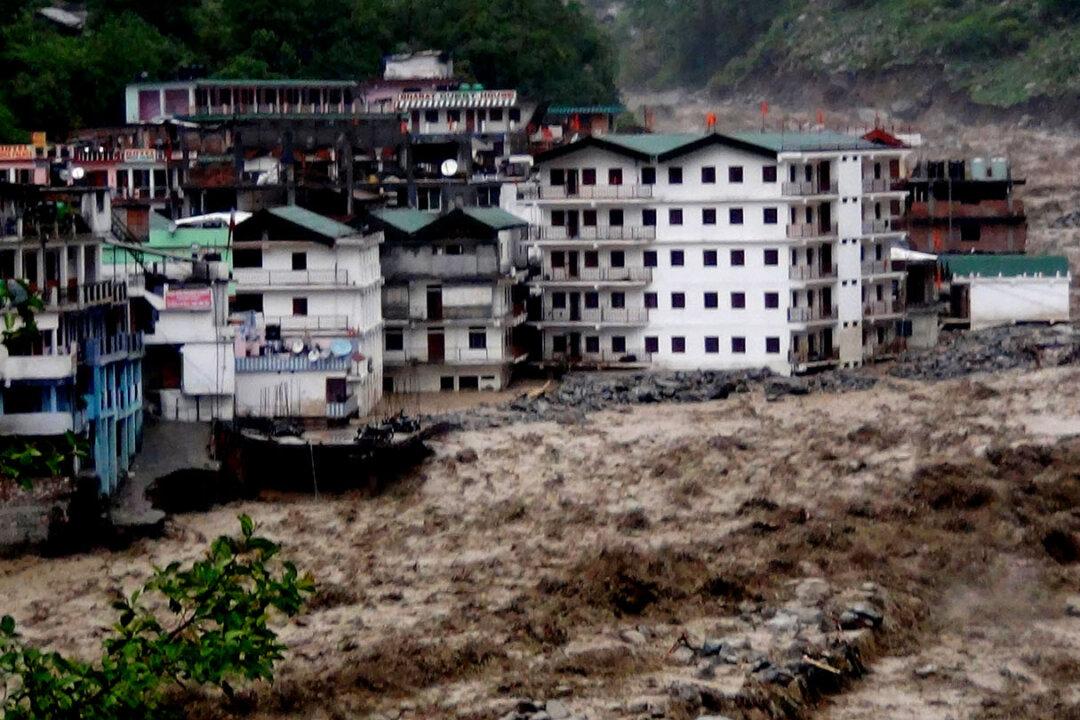On Saturday, an octogenarian professor and environmental scientist, already into his 102nd day of an indefinite fast, gave up drinking water to protest the destruction of the Ganges Basin and the Himalaya Mountains.
In the Himalayan city of Haridwar, environmental engineer G. D. Agarwal started an indefinite fast to stress his demand for the government to scrap all hydro projects on the Bhagirathi, Alaknanda, and Mandakini head-streams of the Ganges [Ganga] River. He has engaged in hunger strikes three times to protest the same issue.
Agarwal’s current protest has gained greater support in the wake of the recent Himalayan floods that are being widely described as a man-made disaster.
The Indian Parliamentarian Forum to Save the Ganges and Himalayas (IPFSG) has recently expressed concern over the issue in a letter to India’s president. The letter, shared with Epoch Times by the South Asian Network on Dams, River, and People (SANDRP), stated, “...there’s an urgent need to re-examine the ongoing, so-called ‘development’ activities in the basin. This great tragedy [flooding] is the result of large-scale deforestation, blasting, tunneling, destruction of underground natural streams, and submergence of forests, which causes the loss of bio-diversity and loss of endangered and threatened species.”
The letter mentions that the conservation of the Ganges and the Himalayas is directly associated with the security of the food and water of 500 million people in the Ganges Basin.
“We have repeatedly warned about the effects of the irrational exploitation of the Himalayas, and how the country will face severe consequences as a result, but we are very disappointed with the government’s role in dealing with this issue,” the members said.
It also states that members of Parliament have unanimously supported the conservation and protection of the Ganges River and the cancellation of the hydro projects on the Ganges and its tributaries in the fragile Himalayas.
On Friday, in a separate incident in support of Agarwal’s demands, three members of the National Ganges River Basin Authority (NGRBA) sent India’s prime minister their resignations. The NGRBA, which is chaired by the prime minister, is a coordinating authority on the Ganges River and its role is to protect the river from environmental degradation.
A copy of the resignation letter, shared by SANDRP, states, “The Uttarakhand 2013 disaster confirmed that many of the fears we expressed about the mismanagement of the Ganges River were valid. It has raised several questions about the way we have abused our rivers. Soon after the disaster, some of us brought this matter to you and sought a brief meeting with you to discuss the issue and seek an early meeting of the Authority. But that never happened.”
The members wrote that Agarwal’s attempt to bring the Indian government’s attention to the plight of the Ganges has been in vain. “But he [Agarwal], too, has been ignored. Starting tomorrow, he will even stop consuming water,” the letter said.
The resigning members have received demands, requests, and other input from citizens and scientists but are disappointed that, since the NGRBA doesn’t hold regular meetings, they do not have an appropriate forum to voice them.
“We are distressed that the NGRBA has not met since Apr. 17, 2012. Even that meeting took place after a gap of 18 months and only after the insistence of some of the expert members. Since Nov. 2011, steering committees have made decisions to spend several thousand crore rupees (billions of dollars) on a variety of physical projects, in which none of the expert members have been included,” they said.





